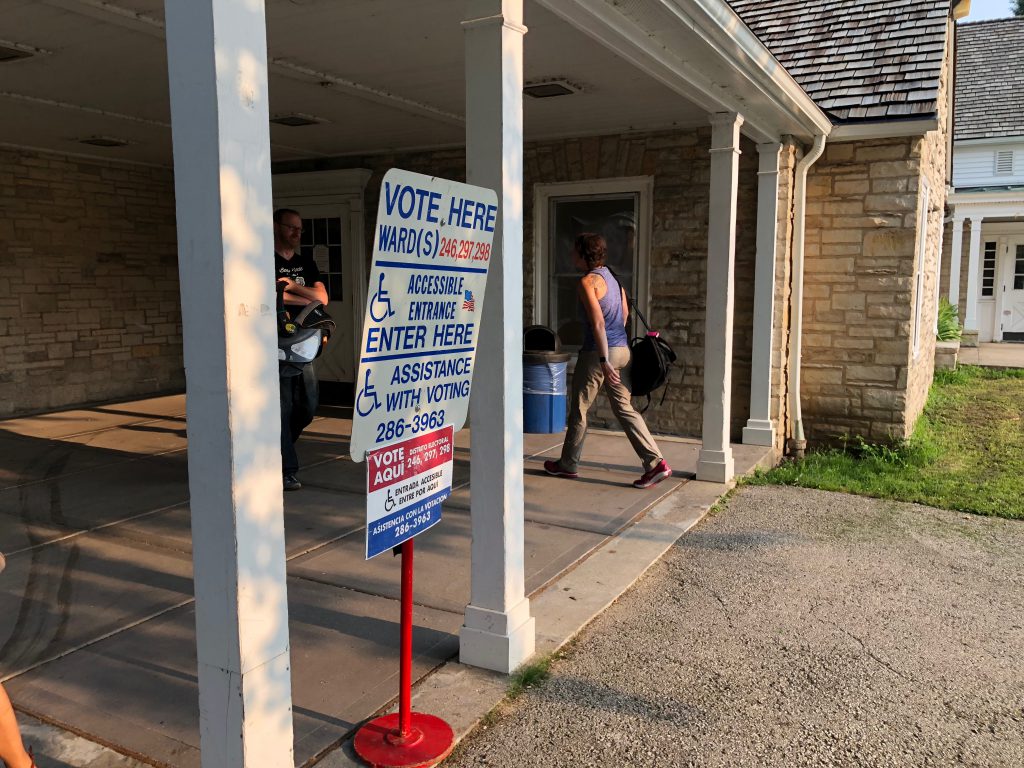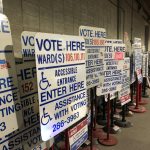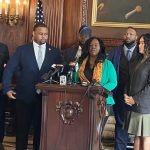Should Wisconsin Allow Fusion Voting?
A movement to allow major and minor parties to back the same candidate.
The University of Wisconsin Law School is hosting a conference Friday on fusion voting, which allows major and minor parties to nominate the same candidate on a ballot. A lawsuit pending in Dane County Circuit Court seeks to overturn Wisconsin’s fusion voting ban, which has been in effect since 1897.
Project Democracy, which is sponsoring “Parties, Power and Possibility: Revisiting Fusion Voting in Wisconsin,” defines it as “the right of political parties to nominate whoever they choose in partisan elections, including the possibility of one candidate being nominated by multiple parties.” The process was once common, according to the group, and two states — New York and Connecticut — allow some version of it.
The advantage of fusion voting, says the group, is that “Multiple parties can nominate the same candidate, allowing voters to choose the party that best matches their values. The totals of each party line are added to determine the winner.”
In a Wisconsin State Journal op-ed on Sunday, political scientists Barry Burden and Lee Drutman, who will speak at Friday’s conference, said “fusion cross-nomination” support from the Democratic and Reform parties led to the nomination and election of Wisconsin Gov. William R. Taylor in 1874.
Protect Democracy cites examples when fusion voting elected U.S. presidents:
-In 1960: Although Richard Nixon received more Republican votes than John F. Kennedy received Democratic votes, Kennedy’s 6% support on the Liberal Party line delivered him the state and the White House.
-In 1980: Ronald Reagan secured 43% of the vote on the Republican line, but his 4% Conservative Party vote pushed him over Jimmy Carter’s 44% Democratic support.
In April, five Wisconsin residents — including two former Republican Party leaders, former Senate Majority Leader Dale Schultz and former Assembly member and Court of Appeals Judge David Deininger — and the group United Wisconsin sued in Dane County to overturn the 1897 ban on fusion voting.
Law Forward, a progressive law firm based in Madison, is representing the group.
The lawsuit cites an 1854 meeting in Ripon that led to the formation of a Republican Party as “fusion’s most familiar success story.”
At that meeting, according to author Jon Meacham in his book And There Was Light, which profiled the rise of Abraham Lincoln, leaders of “Free Soilers, Whigs, anti-Nebraska Democrats and sundry antislavery advocates” gathered to form the Republican Party. That Republican Party nominated Lincoln as its presidential candidate in 1860 and 1864, an era dominated by the Civil War that killed 698,000 Americans.
But, the lawsuit adds, “Later, seeking to secure its dominance over state government, that same Republican Party enacted a prohibition on ‘fusion voting’…to weaken the Democratic Party and to restrain the development of additional political parties.
“It worked on both counts. The Democratic Party could no longer rely on building a multi-party fusion slate anchored by a large immigrant population in Milwaukee.
“Minor political parties are no longer a means for political expression; they are irrelevant in our state and federal elections except on the rare occasions when a minor party candidate might spoil the chances of a major party candidate.”
Most states allowed fusion voting until “the run-up to the Progressive Era,” Protect Democracy says, when “state legislatures around the country then passed new laws prohibiting fusion voting to reduce minor party influence and competition.”
Banning fusion voting “enables the major parties’ chokehold on our politics,” the lawsuit alleges. “More Wisconsin voters identify as independent than either Democratic or Republican, yet all other parties are relegated to the role of spoiler — or they choose not to play at all.”
The lawsuit also argues that the ban is an unconstitutional violation of the state Constitution’s “equal protection” clause.
The lawsuit only addresses and would only affect the nominating process for state candidates.
Lee Rasch, executive director of the group LeaderEthics and president of Western Technical College for 28 years, said in an email he joined the lawsuit because, “The divide between the two major political parties has reached a breaking point, eroding public trust in government and institutions alike.
“Fusion voting offers a practical way forward by allowing third parties to build coalitions that tackle real issues without acting as election spoilers,” Rasch said. “Most importantly, it gives voice to the growing number of voters in the middle — people who want solutions, not more division.”
Republicans who control the Legislature aren’t interested in debating the issue. In a July social media post cited by the MacIver Institute, Assistant Assembly Majority Leader Scott Krug denounced fusion voting.
“These ‘gimmick’ election ideas only lead to more confusion, mistrust and degradation of our election system,” the Republican legislator said. “Voters want common sense reforms that help them feel confident about who’s voting and when they can know the results.”
Steven Walters started covering the Capitol in 1988. Contact him at stevenscotwalters@gmail.com.
If you think stories like this are important, become a member of Urban Milwaukee and help support real, independent journalism. Plus you get some cool added benefits.
The State of Politics
-
A Wisconsin Political Trivia Quiz
 Dec 15th, 2025 by Steven Walters
Dec 15th, 2025 by Steven Walters
-
The Fight Over Wisconsin’s House Districts
 Dec 8th, 2025 by Steven Walters
Dec 8th, 2025 by Steven Walters
-
The Battle Over On-Line Betting
 Nov 24th, 2025 by Steven Walters
Nov 24th, 2025 by Steven Walters






















I suggest we eliminate Party identification on ballots altogether and just print the names of the candidates broken out by the seats being contested.
It is about time that the voter be required to use what is between their ears to choose the person they want to vote for, and not be allowed to simply down ballot vote.